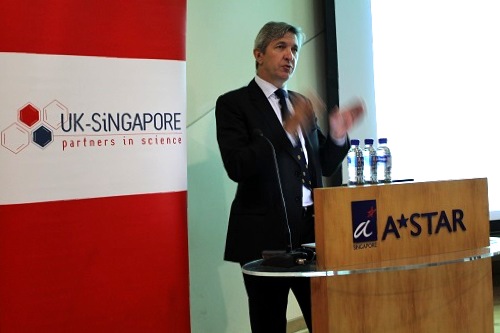11th September 2013 Singapore
Take two aspirin, prevent cancer
Colorectal cancer (cancer of the colon or bowel) is the most common form of cancer in men in Singapore, and the second most common in women. A hereditary genetic condition called Lynch Syndrome significantly increases the risk of developing colorectal cancer. Research carried out by British clinical geneticist Sir John Burn at the University of Newcastle indicates that taking two aspirin a day can halve the risk of people with Lynch Syndrome developing colorectal cancer.

Guest post by Nashya Haider from the Southeast Asia Science and Innovation team:
In light of the importance of this topic, we arranged for Sir John to give a Distinguished Visitor Lecture at the Genome Institute of Singapore. Expanding on his research and his recent article in the British Medical Journal (Should we sequence everyone’s genome? Yes – subscription required), Sir John described the potential of personalised medicine. Taking aspirin to prevent cancer is a simple, cost-effective remedy – but it has some side effects and so requires identification of people with Lynch Syndrome who would stand to benefit.
More broadly, genetic variations mean we have a different response to drugs, but many conditions are still treated with a one-size-fits-all dose which could be ineffective in some cases or lead to dangerous side effects in others. Sir John’s preferred analogy is every customer of a shoe shop being given the same size shoes, ‘and being asked to hobble back next week if they don’t fit’.
A critical enabler for personalised medicine is diagnostic tools, ideally able to be used at the point of care. Sir John is the medical director of a Newcastle-based diagnostics firm called QuantuMDx, which is developing nanotechnology-based portable diagnostic tools. The company has a subsidiary in Singapore, and in May announced collaboration with the Genome Institute of Singapore to develop diagnostic panels for East Asian populations.
QuantuMDx is combining its proven diagnostic technology with expertise from its global partners in disease testing. We took this opportunity to link them to Singapore’s National Cancer Centre, which is developing a new initiative to improve cancer diagnostics.
The wider opportunity which this visit helps us to clarify is around UK-Singapore collaboration in personalised medicine. The UK has genetic expertise across its universities and in centers of excellence like the Wellcome Trust Sanger Institute. The recent announcement of Genomics England, an initiative to sequence the DNA of 100,000 patients should help the UK to build on this leading position.
Singapore has developed world-class expertise at the Genome Institute of Singapore and across a number of other research centers and universities – and is able to test and deploy new approaches to treatment in its excellent health system. Singapore also possesses huge genetic diversity, meaning that approaches with global applicability could be developed using genetic data acquired here. Collaboration in this area is likely to lead to more opportunities for UK research and companies – like Sir John and QuantuMDx – and ultimately better outcomes for patients.